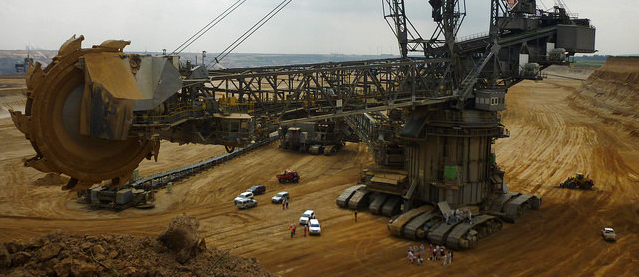In a recent op-ed published in Le Monde, French economist – and Emmanuel Macron’s economic program inspirer – Jean Pisani-Ferry argued that economic growth was necessary to fight against climate change and called for eco-productivism. The following op-ed is a reply to Pr. Pisani-Ferry that was originally published in Le Monde (in French). Recently, there have been calls for eco-productivism to make capitalism green: growth would be indispensable in the fight against climate change. The investments needed to tackle the ecological crisis will certainly generate growth. This will lead to a new accumulation of capital, better adapted to a low carbon economy. Growth and capitalism may thus appear in the short term as conditions for an ecological transition. No one would deny that it is possible to make capitalism greener, nor that it should be urgently done. Yet the proposal of eco-productivism remains short-sighted. First, this proposal ignores the ecological situation and too often reduces it to climate change, ignoring two other essential dimensions: the material footprint and biodiversity. It should be recalled that no decarbonization appears in global emissions data outside of global recessions. The atmospheric concentration of CO2 approaches 413 parts per million, which is above the median level compatible with a warming limited to 1.5 degrees by the end of the century, below the 2016 level (Masson-Delmotte et al., 2018, see also this presentation). Secondly, no dematerialization is happening. Worldwide material extraction has more than tripled since 1970, primary material use is expected to double by 2060, and material use efficiency has decreased since 2000. This means more greenhouse gas emissions, accelerated depletion of natural resources and further erosion of biodiversity (OECD, 2019; Schandl et al., 2018). A recent meta-analysis (Haberl et al., 2020) including 835 scientific articles examining the correlation between GDP, greenhouse gas emissions, energy and materials indicates that this correlation is incompatible with a sufficient reduction in greenhouse gas emissions and the use of natural resources. Given currently available data and at the macroeconomic level, there is no empirical basis for a realistic policy discourse on green growth and green capitalism. Second, the proposal of eco-productivism reduces the ecological transition to an investment issue and a technological challenge. There is no investment or expenditure of any kind that does not have a physical counterpart, even for goods and services that are ‘decarbonized’ or have minimal material content or are made of recycled materials. Consequently, the question of the nature of production, its volume, its pace and the distribution of its outcomes inevitably arises. The transition is a political question. It is not a question of being against technological innovation. It is a question of putting it at the service of social innovation and rehabilitating the latter. Increasing productivity is seen as necessary to combat climate change and productivity would mean growth. This is historically true because productivity gains were subjected to production expansion. However, productivity can perfectly well be subjected to a constant or reduced production, of better quality, whose fruits would be much better distributed and which would allow an organized and equitable working time reduction. As always, the direction of technological progress depends on the social organization in which it is embedded and the political choices that decide its uses. The link between technology and growth tends to become more and more unequivocal: the pursuit of growth makes technology increasingly necessary to limit or repair, to the extent possible, the environmental impacts of our socio-economic organization. In other words, technological innovation is becoming a palliative to the lack of social innovation. Sooner or later, social innovation will be the issue if we want to preserve our ability to live together within the ecological limits of the planet. Faith in an eco-productivism reflects the persistent disconnect of political-economic thought with the ecological and physical realities that limit the scope of possibilities of production and consumption. We are therefore faced with two paradoxes. First, a political paradox. On the one hand, growth is the historical norm and its defenders therefore logically appear to be the reasonable and realistic camp. On the other hand, all the data on greenhouse gas emissions, material footprint and biodiversity indicate that it is completely unreasonable and unrealistic to advocate the pursuit of growth. Second, an intellectual paradox. On the one hand, a large part of economics has historically maintained an oedipal relationship with physics and natural sciences, attempting to espouse their methods and criteria of scientificity. On the other hand, such economic approaches continue to be largely blind to what physics and natural sciences have to say about production-consumption processes and their limits. From these two paradoxes results a blind spot in collective thinking that risks leaving us powerless to imagine a future organization of our societies. What is at stake is not so much to say suddenly farewell to growth and capitalism. Rather, it is to admit the possibility that the ecological limits of the Earth will gradually make growth impossible, exacerbating the intrinsic contradictions of capitalism and imposing another socio-economic organization. The approach is thus that of a social precautionary principle. We must reflect collectively and deliberate democratically on the following question: How can we organize our societies in a way that is compatible with the ecological limits of the planet, for example in a way that does not make growth a condition for political stability, social cohesion and individual and collective well-being? Even with an adjective or a prefix, productivism is still productivism: rather than growth, what the ecological transition needs is above all democratic deepening and social innovation. This op-ed was originally published on the website of the newspaper Le Monde: https://www.lemonde.fr/idees/article/2020/10/29/eco-productivisme-la-transition-ecologique-est-une-question-politique_6057749_3232.html

The call for courses for our Degrowth in Action - Climate Justice Summer School 2015 has now been extended to 7 May. The summer school will take place from 9 to 14 August 2015 in the lignite-mining region of the Rhineland in cooperation with the annual climate camp. The core of the summer school programme is made up of courses that take place continuously over 4 days. In addition, there is the ...

Europe is exhausted. It is exhausted after long years of what is labeled as the Eurozone crisis. It is exhausted after years of economic success and – now – prolonged years of political failure. Every single attempt of deepening the political union of Europe after the enactment of the Maastricht Treaty in 1993 and the [...]

By Frigga Haug At the closing event of the attac-congress on capitalism in 2009, the German politician Heiner Geissler pleaded for an eco-dictatorship. After all, even as a prominent member of the Christian Democratic Party he had joined attac out of concern over problems of capitalist society, among them the ecological one - and was now calling on the 2000 or so participants to take action to...